S'pore experts debunk claims of link between Covid-19 vaccines and neurological diseases, say more evidence needed
Sign up now: Get ST's newsletters delivered to your inbox

More complete data will still be needed to prove the link between vaccination and cardiovascular disease.
PHOTO: REUTERS
SINGAPORE - Claims that mRNA Covid-19 vaccines could cause neurological diseases such as Alzheimer's and Parkinson's have been making the rounds on social media and messaging apps recently.
They come after the publication of a research paper in scientific journal Scivision, which suggested that mRNA vaccines such as the ones developed by Pfizer and Moderna could potentially trigger prion disease.
But local scientists have been quick to debunk these claims.
Associate Professor Sylvie Alonso, co-director of the National University of Singapore's Infectious Diseases Translational Research Programme, said that prion disease is a result of one's proteins adopting an unusual arrangement, causing them to aggregate.
These aggregates - known as amyloids - can then harm the cells, causing neurological diseases such as Alzheimer's disease, she added.
Alzheimer's disease is a consequence of amyloids accumulating in the brain cells.
The mRNA vaccines contain fragments of the Sars-CoV-2 virus' genetic material, which has instructions for making the spike protein specific to the virus.
This "trains" the human body to recognise the invader so that it can produce human immune cells to fight against it.
The research paper claimed that two types of RNA-binding proteins - namely the FUS and TDP-43 proteins - could bind with the vaccine's mRNA molecules, causing a possible formation of protein aggregates leading to neurological disease.
Debunking this, Assoc Prof Alonso said that TDP-43 and FUS proteins bind to mRNA molecules and rearrange them, so as to control the body's protein production.
The two proteins have "prion-like regions" which may lead to the formation of protein aggregates under certain circumstances.
Accumulation of these aggregates in the central nervous system is known to lead to neurodegenerative diseases, such as amyotrophic lateral sclerosis (ALS).
Those with ALS have damage to their motor neurons, affecting their brain and spinal cord, and eventually their muscles.
However, there is no experimental evidence at this stage to support the claim that these proteins bind with the mRNA molecules from the vaccine, said Prof Alonso.
Professor Paul Tambyah, deputy director in the same programme, added that it could take years to prove or disprove such a claim, given that neurological diseases take a long time to develop.
Several other social media posts have also suggested that taking the Covid-19 vaccine could lead to cardiovascular disease and stroke.
For instance, a post on April 22 by Facebook user Jo-ann Tan had claimed that her brother-in-law had suffered three strokes within two days of receiving his first dose of the Covid-19 vaccine on April 18.
Changi General Hospital responded on April 23 with a Facebook post saying that its preliminary assessment does not indicate that the vaccine was the cause of his stroke.
This was not the first time that such allegations were made.
On April 15, the Ministry of Health instructed the Protection from Online Falsehoods and Manipulation Act (Pofma) Office to issue corrections to the Facebook pages of Goh Meng Seng People's Power Party and Goh Meng Seng (Satu Singapura) for implying that the Covid-19 vaccination had caused or substantially contributed to a doctor in Singapore suffering a stroke.
It added that there is currently "no credible evidence" suggesting that there could be increased risk of heart attack or stroke after a person takes the Pfizer or Moderna vaccine.
Prof Tambyah said that researchers are still learning about the coronavirus and the immune system response to its various components, including the spike protein.
He noted that local researchers had recently published a study where asymptomatic patients had experienced late presentations of stroke, after recovering from Covid-19.
All 18 were migrant workers who were aged between 35 and 50 years old.
However, more complete data will still be needed to prove the link between vaccination and cardiovascular disease.
"Currently, there are close to a billion people worldwide who have been vaccinated against Covid-19 and there has not been a rise in the incidence of cardiovascular disease reported or any groups identified at higher than normal risk of cardiovascular complications," Prof Tambyah said.
"What is more important is for those who have been vaccinated to report any symptoms or complications that they might have... so (that) these can be studied and investigated completely," he added.


